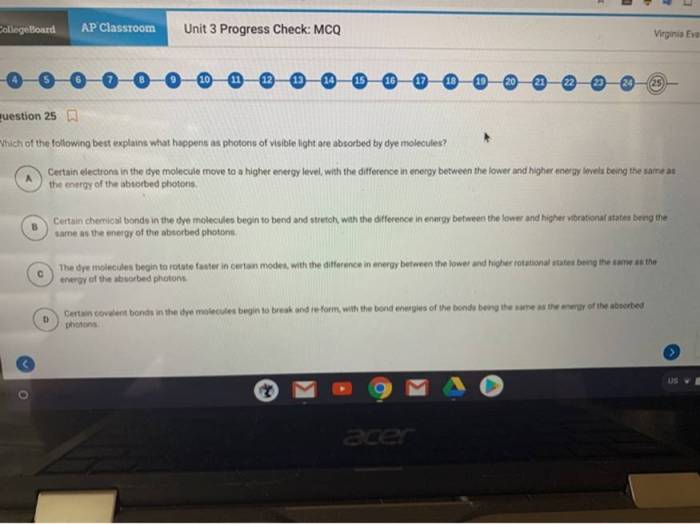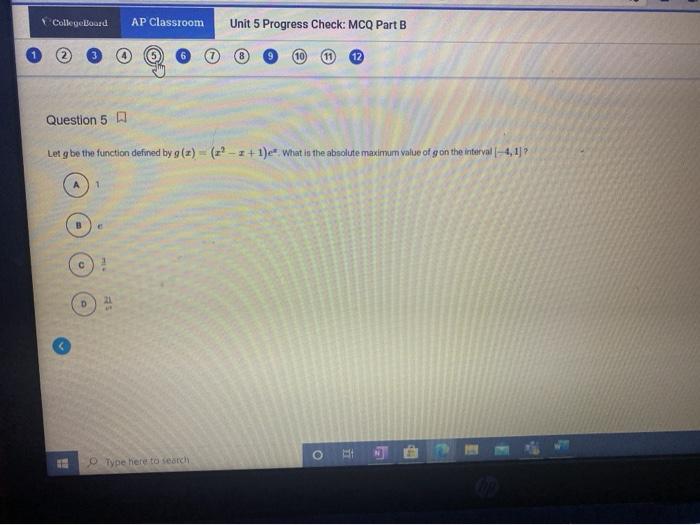Embark on an in-depth exploration of Apes Unit 6 Progress Check MCQ Part B, a comprehensive assessment tool designed to evaluate students’ grasp of key concepts, cognitive abilities, and overall progress within this unit.
This progress check employs a range of multiple-choice questions (MCQs) that delve into the core content of Unit 6, providing valuable insights into students’ understanding of the subject matter.
Multiple Choice Questions (MCQs)

The MCQs in Unit 6 Progress Check Part B are designed to assess your understanding of the unit’s key concepts and theories.
Each MCQ typically consists of a question or statement followed by four possible answers. Only one answer is correct. You must select the best answer from the choices provided.
MCQ Format
- Questions are typically short and concise.
- Questions may be in the form of a statement that you must determine is true or false.
- Answers are usually presented in a multiple-choice format.
Example MCQs, Apes unit 6 progress check mcq part b
- Which of the following is NOT a characteristic of primates?
- Opposable thumbs
- Binocular vision
- Long tails
- Large brains
- True or False: All primates are arboreal.
Strategies for Answering MCQs Effectively
- Read the question carefully and identify the key concepts.
- Eliminate any answers that you know are incorrect.
- Consider the context of the question and the unit’s content.
- If you are unsure of the answer, make an educated guess.
- Review your answers carefully before submitting them.
Content Knowledge Assessment: Apes Unit 6 Progress Check Mcq Part B

Assessing content knowledge in Unit 6 is crucial for evaluating students’ comprehension of key concepts and their ability to apply them in various contexts.
The following are key concepts covered in Unit 6:
- The concept of natural selection and its role in evolution
- The process of speciation and the different modes of speciation
- The genetic basis of evolution, including the role of mutations, gene flow, genetic drift, and non-random mating
- The patterns and processes of human evolution, including the emergence of Homo sapiens
- The applications of evolutionary principles in fields such as medicine, agriculture, and conservation biology
Examples of questions that test students’ understanding of these concepts include:
- Explain the process of natural selection and how it contributes to the evolution of populations.
- Describe the different modes of speciation and provide examples of each.
- Discuss the genetic basis of evolution, including the role of mutations, gene flow, genetic drift, and non-random mating.
- Trace the evolutionary history of humans, including the emergence of Homo sapiens.
- Explain how evolutionary principles can be applied to solve problems in fields such as medicine, agriculture, and conservation biology.
Cognitive Skills Evaluation

The Multiple Choice Questions (MCQs) in Part B of the Apes Unit 6 Progress Check are designed to evaluate students’ cognitive skills, particularly their comprehension, analysis, and application of the concepts covered in the unit.
Comprehension
Comprehension MCQs assess students’ ability to understand and interpret the information presented in the question. These questions require students to recall facts, concepts, and relationships from the unit. For example:
- Which of the following is NOT a characteristic of primates?
- What is the function of the prehensile tail in monkeys?
Analysis
Analysis MCQs evaluate students’ ability to break down information into its component parts and identify the relationships between them. These questions require students to compare, contrast, and evaluate different concepts.
- Compare and contrast the social structures of chimpanzees and gorillas.
- Explain how the adaptations of primates have allowed them to occupy a wide range of habitats.
Application
Application MCQs assess students’ ability to use their knowledge and skills to solve problems or make predictions. These questions require students to apply the concepts learned in the unit to new situations.
- Predict the impact of deforestation on a population of gorillas.
- Design a research study to investigate the feeding behavior of a particular primate species.
Performance Indicators

Evaluating students’ progress in Unit 6 requires the use of multiple performance indicators to ensure a comprehensive assessment of their learning. These indicators measure various aspects of students’ knowledge and skills, providing a holistic view of their understanding.
MCQs in Part B
The Multiple Choice Questions (MCQs) in Part B of the Progress Check contribute significantly to assessing these performance indicators. The MCQs test students’ understanding of key concepts, their ability to apply knowledge to new situations, and their critical thinking skills.
Importance of Multiple Performance Indicators
Using multiple performance indicators is essential for a comprehensive evaluation because it allows for a more accurate assessment of students’ abilities. Different indicators measure different aspects of learning, providing a more complete picture of students’ strengths and weaknesses. This comprehensive approach ensures that students are not unfairly evaluated based on a single performance indicator and that their overall progress is accurately reflected.
Commonly Asked Questions
What is the format of the MCQs in Apes Unit 6 Progress Check Part B?
The MCQs typically consist of a stem that presents a question or incomplete statement, followed by several options from which students must choose the best answer.
How do the MCQs evaluate students’ cognitive skills?
The MCQs are designed to assess a range of cognitive skills, including comprehension, analysis, and application. They require students to understand the content, analyze information, and apply their knowledge to new situations.
What are the performance indicators used to evaluate students’ progress in Unit 6?
The performance indicators used to evaluate students’ progress include their ability to recall and apply key concepts, demonstrate critical thinking skills, and communicate their understanding effectively.